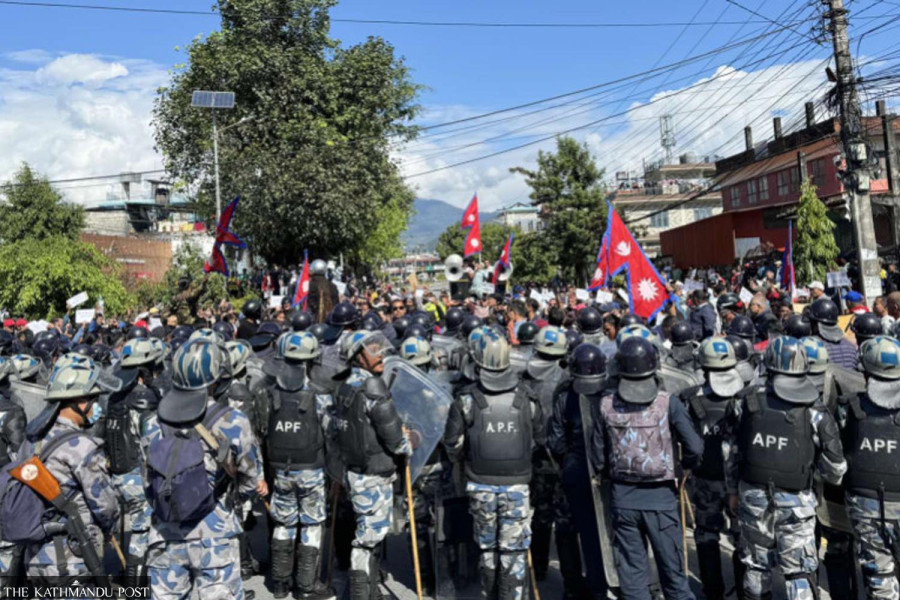National
Nearly 1,000 personnel quit Nepal Police and Armed Police Force in three months
Most of them resigned, citing family or personal reasons as morale dips after Gen Z protests, officials say.
Matrika Dahal
Around 1,000 security personnel have resigned from the Nepal Police and Armed Police Force (APF) in the past three months. According to officials, about 450 personnel from the Nepal Police and 550 from the APF, including both officers and lower ranks, have left the service. Some of them had completed 20 years of service, while others had served for only about five years.
Both security agencies said most of the resignations were filed citing family or personal reasons. Recently, Senior Superintendent of Police Prakash Ranabhat also resigned, mentioning personal reasons, though his resignation has not yet been approved. Most of those resigning belong to the lower ranks, from constables to senior sub-inspectors.
Officials said the wave of resignations has increased after the Gen Z movement. During the protest on September 8, police opened fire, killing 19 people. The following day, violent demonstrations spread across the country, with protesters targeting police offices and barracks. On that day alone, more than 1,200 police weapons were looted, and records show about 100,000 rounds of ammunition remain missing. Three police personnel were killed in clashes with demonstrators on September 9. In Kathmandu’s New Baneshwar area, protesters forced police officers to strip off their uniforms and chased them away.
Deputy Inspector General of Police (DIG) Binod Ghimire, spokesperson for Nepal Police, said resignations citing family or personal reasons are being submitted almost daily. “Most of those resigning are from lower ranks,” he said. According to police records, 90 personnel have resigned with gratuity benefits since mid-July, while around 350 others have retired with pension benefits after completing 20 years of service.
Similarly, in the APF, a large number have resigned either with pension or gratuity benefits. The APF headquarters said that in mid-September to mid-October alone, 285 personnel resigned with pension benefits and 18 with gratuity. Another 118 personnel’s resignations took effect from October 18.
In the fiscal year 2023-24, 458 personnel in the Nepal Police resigned with pension benefits and 333 with gratuity. In 2024-25, the number rose sharply to 2,015 with pension and 358 with gratuity. In the APF, 256 personnel resigned with pension benefits and 220 with gratuity in 2023-24. The following year, the numbers jumped to 1,391 with pension and 160 with gratuity.
Those completing 20 years of service qualify for a pension, while others receive gratuity based on their years of contribution. Personnel cannot resign before completing five years of service. The pension eligibility differs between those who joined before and after March 2004. Those who joined before that date qualify for a pension after 16 years of service for office assistants to head constables, 18 years for sub-inspectors, and 20 years for inspectors and above. For those joining later, the requirement is 20 years for all ranks.
Lower-ranking personnel have expressed dissatisfaction with this provision, demanding that the old system be retained. A bill to amend the law accordingly had been under consideration, but the process stalled after the dissolution of the House of Representatives following the Gen Z protests.
DIG Ghimire said resignation is a matter of personal choice, and the organisation cannot restrict it. “It is an individual’s decision,” he said. “Sudden incidents and the psychological impact they cause on security personnel have also become factors leading to resignations.”
He added that the tense situation following the Gen Z protests has demoralised many personnel, contributing to the rising number of resignations. Other reasons include seeking alternative employment, family issues, and plans for foreign employment.
APF spokesperson Shailendra Thapa also said resignations are part of a continuous process. “It is better if personnel serve until the end of their tenure as prescribed by law,” he said. “Experienced personnel naturally perform more effectively, but the law allows for voluntary resignation.”
According to officials, training and field deployment of a single security personnel costs the state between Rs500,000 and Rs700,000. Beyond that, the government also bears pension and family support expenses after retirement. Officials warned that the lack of an effective retention strategy has led to increasing mid-service resignations, causing a financial and manpower loss to the state.




 18.12°C Kathmandu
18.12°C Kathmandu














